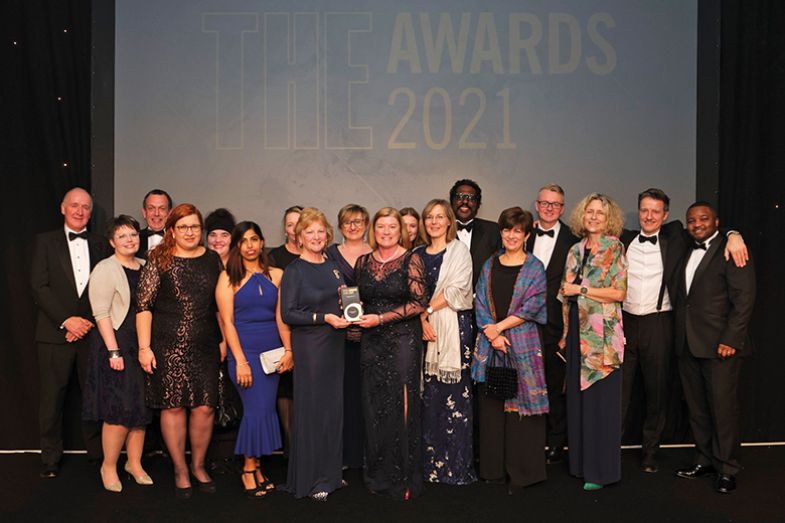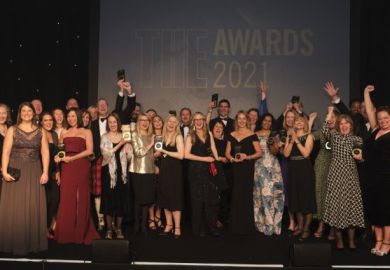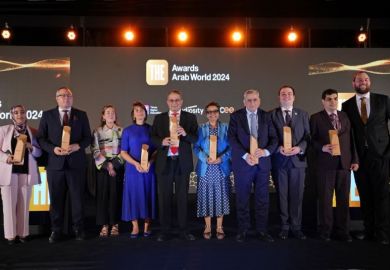University of the Year
When Cara Aitchison joined Cardiff Metropolitan University five years ago she had to take the decision to lose more than a tenth of staff through voluntary redundancy as the institution – which had previously staved off a merger with other Welsh universities – teetered on the brink of financial instability.
Fast forward to 2021, and she was bringing the Times Higher Education award for University of the Year back to a campus where she said everyone felt they had played a part in earning the accolade.
“Every single member of staff [has had] exactly the same reaction…They believe this award is for them. They can all see, and believe, that they made a contribution. They are not looking at it as if one group of staff won this award. They won this award.”
For Professor Aitchison, the emergence of this strong sense of community after being in such a difficult position is the key reason for the university’s success, alongside developing the “pockets of excellence” it already had.
Cardiff Met’s 2017 strategic plan was built around seven core priorities, including developing a Cardiff School of Technologies to help meet local economic need, the development of 40 new degree programmes, and improving research impact and quality.
But underpinning these was also a “values-driven” transformation of the leadership culture at the university.
In practical terms this meant initiatives like a monthly Leaders’ Exchange, where managers across the institution could share ideas and best practice, as well as regular updates for staff on the progress being made.
“I think we built through a number of mechanisms a high level of trust and respect,” said Professor Aitchison. “People understood the values and then I think they could see us all living the values. You do get into [a] kind of virtuous circle then where people were more loyal to the organisation and each other.”
Professor Aitchison said that this approach paid huge dividends when Covid-19 hit, enabling it to fully involve staff as it started its shift to online teaching in January 2020, well ahead of lockdown in March.
The university’s mantra of “compassionate leadership” also bore fruit here too, she said, such as by allowing staff time to look after children and relatives when they faced the pressures of juggling home and work.
The results of all this have included a much healthier financial position, above average student satisfaction, and research and innovation income increasing by two-thirds in four years.
That has now led to a situation where the university can embark on major campus redevelopment and focus on its goal to reach net zero emissions by 2030.
Such “really major developments…simply wouldn’t have been possible five years ago,” said Professor Aitchison.
However, the people-centred approach is what she is most proud of: “I think through this there’s a really strong sense that people at Cardiff Met want to serve the organisation. It has really made us think quite deeply about slightly old-fashioned notions of public service.”
simon.baker@timeshighereducation.com

International Collaboration of the Year
For Shabbar Jaffar, chair of epidemiology at the Liverpool School of Tropical Medicine, the central idea behind the Respond Africa research partnership was “very simple”. A number of “big diseases” – HIV, diabetes and hypertension – have very high mortality rates in Africa, but still tended to be “managed separately, in vertical stand-alone clinics,” he said. “My idea was to bring them together and integrate that care.”
To make this vision happen, Professor Jaffar put together the team of international partners in the UK, the rest of Europe and Africa which won the International Collaboration of the Year award. A crucial challenge was building trust not only between different stakeholders, but between people from very different backgrounds.
One issue, explained Professor Jaffar, was an understandable distrust among some Africans of “Westerners coming in to sort things out”, of projects in which Westerners “control everything because we come in with the money”. Crucial ways to address this included “transparency in decision-making” and a genuine commitment to equity, capacity building and empowering others, he added.
Furthermore, as a head of department at LSTM, Professor Jaffar has put great stress on “unconscious bias training”, for example through “small-group workshops focusing on racism”. Although he acknowledged that there wasn’t “a hard solution for racism”, in the way one might cure a medical condition, “you can discuss, tackle...and keep yourself aware of racism”.
Respond Africa was initially launched in particular regions of Tanzania and Uganda. Current plans were to scale up the interventions to national levels to see if they were equally effective within different settings – and from there into Cameroon and, Professor Jaffar hoped, “eventually across Africa”.
Matthew Reisz
Outstanding Contribution to Equality, Diversity and Inclusion
When the Scottish government began providing funding to tackle period poverty in universities, Ruth Cochrane noted it was mostly going to facilities managers: “Middle-aged men were getting a cheque to buy tampons and they definitely didn’t know what to do with it.”
So the lecturer in product design at Edinburgh Napier University co-produced a module for design and television students that sought to make use of the cash, which led to student collective Bleedin’ Saor picking up the award for Outstanding Contribution to Equality, Diversity and Inclusion.
The students gathered testimonies of period poverty and found that access to products was not the only issue; there was also a lot of shame around periods.
This gave rise to several initiatives. One was a Bloody Big Brunch, hosted on campus, at which hundreds of students bought a bloody mary and paid for it with period products that were then donated to women in need.
The students designed period product dispensers which they called “menstruation stations” that were placed in highly visible positions on campus. Such units have now been installed in schools, colleges, and universities across Scotland.
The television students on the module created Bleeding Free, a documentary that tracks the group’s progress and a visit that it made to Uganda to meet organisations promoting gender equality and menstrual health.
For Ms Cochrane, eliminating shame around periods is related to wider gender equality. She said: “I’ve been a feminist my whole life and it feels as if we kind of missed it…but the result of that is women’s health doesn’t get the proper funding that it needs.
“Something like one in three women experiences debilitating [period] pain, which you would’ve thought if that was in the normal discourse, we might have done something about that by now.”
Rosa Ellis
Research Supervisor of the Year
Having supervised dozens of agricultural engineering PhD candidates, Richard Godwin might have been expected to take it easy in retirement. But since leaving Cranfield University in 2007, the internationally renowned soil dynamics expert has continued to devote his time to support and mentor doctoral students, supervising researchers from Botswana to Bangladesh as a visiting professor at Harper Adams University.
“I was an international student myself, in Illinois, so that has driven my interest in helping these students,” said Professor Godwin, who is currently helping a Kenyan student gain PhD funding. “My subject area is also very international – there are, in fact, better job opportunities internationally than in Britain because we have to feed the world and we’re not going to do that from the UK’s shores,” he added.
His former PhD students recently dialled in to an online party to toast Professor Godwin’s win at the THE awards, with several of them stating their appreciation for his post-PhD mentorship.
“It’s not something I intentionally set out to do but it was how I was supported at Illinois,” he said.
Many students also appreciate his willingness to be challenged, even after a lifetime of awards and highly cited papers.
Professor Godwin intends to gradually step back from supervision duties, but may still be getting his hands dirty in the field (literally), if required: “It’s sometimes said that I can do both advanced calculus and digging holes, as well as everything in between – I’ll see what happens next, and leave it up to serendipity.”
Jack Grove
Outstanding Marketing/Communications Team
With the University of Oxford’s researchers playing a vital role in the battle against Covid, its Public Affairs Directorate put a global communications strategy into action to demonstrate that role to people around the world, and to build knowledge.
That has helped ensure that over the course of the pandemic, Oxford has had an impact on policies from the vaccine roll-out to the wearing of face coverings, with the public affairs team also supporting a fundraising drive that raised more than £187 million for crucial projects.
The communications strategy aimed to make Oxford “a go-to source of information for our communities, the media, policymakers, research funders and philanthropists”, said Alexander Buxton, the university’s head of strategic communications. “This was delivered while providing 24/7 support to our scientists on breaking and reputational issues and for the most part, working remotely.”
That meant a collaborative effort between researchers, communications professionals, public engagement experts, science communicators and those with digital skills.
“Together, we worked to the guiding principles of accuracy, timing, and transparency, with a large dash of creativity,” said Mr Buxton, with the team working “through thoughtful counsel and consultation with subject matter experts, while maintaining an emphasis on a people-focused approach to scientific storytelling, combatting disinformation in a variety of forms”.
The team is “tremendously grateful for this recognition of the teamwork and dedication the pandemic has catalysed across our internal and external communications, creative, digital, events and public affairs teams,” he added.
John Morgan
POSTSCRIPT:
Print headline: Stories behind the THE Awards 2021 winners
Register to continue
Why register?
- Registration is free and only takes a moment
- Once registered, you can read 3 articles a month
- Sign up for our newsletter
Subscribe
Or subscribe for unlimited access to:
- Unlimited access to news, views, insights & reviews
- Digital editions
- Digital access to THE’s university and college rankings analysis
Already registered or a current subscriber?














